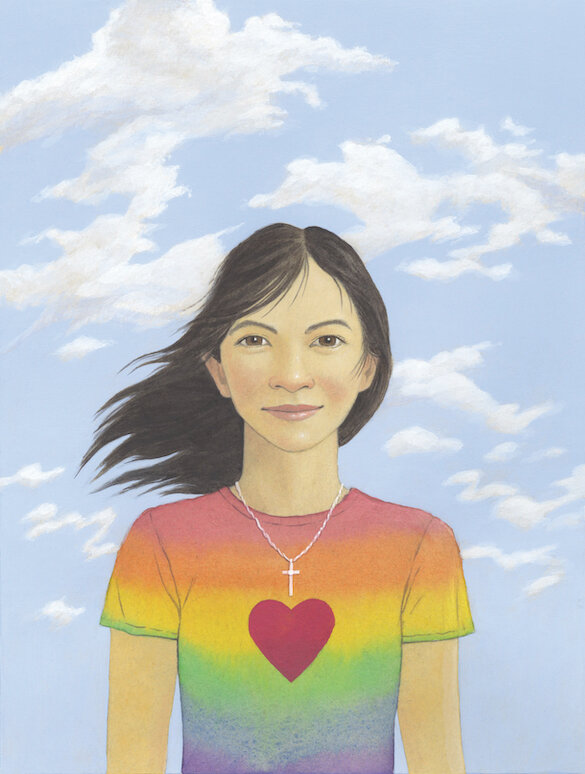The following is a sample profile from the book Holy Troublemakers & Unconventional Saints by Daneen Akers.
Cindy Wang Brandt
It’s a bright and sunny day in Taiwan, a perfect day for a parade. There are rainbow flags on the floats, lampposts, street signs, and buildings—people even wear rainbow outfits and nearly everyone waves a rainbow flag. The many colors of the rainbow symbolize all of the different types of people in the world, especially those who are LGBTQ. Pride parades like this one happen every year in almost every major city in the world. They are joy-filled events where people who have often been mistreated because they’re LGBTQ can celebrate who they are with a supportive, celebratory crowd.
Cindy Wang Brandt, her mother, and her brother attend the parade together. They know the world is a much better place when a wide range of voices and perspectives are acknowledged and heard. Cindy and her mom especially want to show their love and support for Cindy’s brother who is transgender.
Illustration by Rebecca Solow
The laughter, smiles, and good cheer of the crowd are contagious. Cindy loves people, and being around this many people who are having such a good time fills her heart with joy. She knows life hasn’t always been easy for her brother, and she loves being here on a day like this with a crowd of people who show her brother and other LGBTQ people love and support.
“Hey Cindy,” a friend calls out. “You need this.”
The friend hands Cindy a rainbow ribbon, and Cindy ties it in her hair. She and her brother take a selfie with the bustling parade in the background. Later, Cindy decides to share that picture online. She pauses for a few minutes before she posts it because she knows that some people in her life will not approve of her even being present at a Pride parade. But then she thinks about her brother and how much she loves him, and she posts it.
A few days later, Cindy gets a message from her boss. Cindy works at a conservative Christian school that does not embrace LGBTQ people or their equal rights. The principal has called her to his office, and Cindy feels like a child who’s in trouble as she walks down the hall. The door clicks shut behind her with an ominous sound. Not only is the principal there, but her principal’s boss, too. Cindy gulps, suspecting this conversation is not going to be easy.
“Are you aware that your support of the Pride parade violates the school’s policies?” the principal asks Cindy.
“I believe I am allowed to have a personal belief as a private person that does not entirely agree with all of the school’s policies,” Cindy says, trying to sound calm.
The conversation goes back and forth, and eventually Cindy is told that she must stop saying or posting anything that shows her support of LGBTQ people, especially marriage equality.
Cindy knows she can choose either to keep her job or to be honest about her convictions. Cindy had seen too much harm done to LGBTQ people like her brother from attitudes and policies like the ones her school holds. She quits her job.
Disagreeing with a conservative Christian school’s policies wasn’t the beginning of Cindy’s challenges with faith. She had become a Christian at this very school when she was an elementary-school student. Growing up in Taiwan, most of the people in her country were Buddhist. Her own parents didn’t raise her brother or Cindy in any particular faith tradition, but Cindy had always been a high achiever and soon saw that, in her school’s eyes, the best students were Christian. She also came to believe in God and believed in the Bible and was baptized into the Christian faith. At the time, she didn’t know that the school held a very conservative understanding of Christianity.
Cindy went on to attend a conservative Christian college and was trained as a missionary. She and her new husband went to China as missionaries, hoping to spread their faith. Soon Cindy became a mother to a daughter and a son. Becoming a parent made Cindy question some things she’d been taught in the church, such as the belief that children are born sinful and need to become Christians in order to be saved. Her church expected her to be quite strict with her children because their eternal salvation was at risk. She started to feel that children were actually still full of God’s original blessing.
Of course we all can forget that we are created in the image of the Divine, and life can be so busy and stressful at times that we act selfishly, but she just couldn’t see a baby or child as full of sin. Rather than punishing her children when they made bad choices, she talked to them to help them remember their created-in-the-image-of-Godness. They were their own people, worthy of respect just as they were. And if they didn’t choose to be Christians when they were older, that was okay with her. She respected their choices. Cindy started to write a blog sharing some of her thoughts about raising children. Her questions and honesty surprised many of her friends in the church.
But Cindy kept writing. Every time she published a new essay, she felt just a little bit freer inside.
After she quit her job, she spent her extra time writing. She began to invite other parents like herself—those who were putting distance between themselves and conservative Christianity and who wanted to raise their children without fear-based parenting techniques—to join her. She made sure all of them were 100 percent supportive of LGBTQ people. In fact, many who joined her group were LGBTQ themselves or had gay or transgender children.
Soon Cindy had thousands and thousands of people from all over the world in her online community. She started a podcast, became a public speaker, and then wrote a book about her beliefs. The more she spoke her truth, the more she felt free. The more other parents like Cindy heard her words, they more they realized that they were not alone—they felt more free, too. That’s how freedom for one person brings about freedom for others. “Rules matter less to me than human lives,” Cindy says.
What words feel truly freeing to you?
Glossary Terms
Buddhist/Buddhism
A person who follows the Buddhist religion. Buddhism is based on the teachings of Buddha, who lived more than 2,600 years ago in India. Buddha taught that everyone suffers in life, but that there are ways to become “enlightened” and stop feeling personally oppressed by the loss and pain that occur in life. (See also Engaged Buddhism.)
Christian/Christianity
A person who practices Christianity, the Abrahamic Religion based on the teachings of Jesus, a first-century Jewish teacher. While there are many different types of Christians who vary widely in belief and practice, all find the life and teachings of Jesus to be of central importance.
Conservative
A person who tends to like things the way they are or the way they have historically been; conservatives work to limit political, theological, and social change.
Conviction
A strong, unchanging belief.
Evangelical Christianity
A type of Protestant Christian; loosely organized in comparison with Catholics or more formal denominations. The name refers to sharing one’s faith with other people or “evangelizing”; usually evangelicals place a strong emphasis on personal conversion often by saying a simple prayer popularly known as the “sinner’s prayer” that invites Jesus into one’s heart. In the U.S., White evangelicalism has been strongly connected with Conservative social politics since the 1980s.
Gay
A person who can fall in love with someone of the same sex.
LGBTQ
The acronym for Lesbian, Gay, Bisexual, Transgender, and Queer people; other commonly used acronyms for gender and sexual minorities include LGBTQI, LGBTQIA, and LGBTQ+.
Marriage Equality
When same-sex couples (gay or lesbian) are legally allowed to marry and enjoy the same rights as opposite-sex (heterosexual) couples.
Missionary
A person who travels to another country to promote a religion, often Christianity.
Original Blessing
The idea that humans are born with basic goodness and have all they need to live in harmony with God, others, and creation. More than just being made in God’s image, this idea is that God offers people unconditional love as a blessing forever.
Pride Parades
Outdoor events celebrating Lesbian, Gay, Bisexual, and Transgender self-acceptance, achievements, legal rights, and life. Rainbow flags are waved to celebrate the beautiful diversity of humanity with a specific emphasis on LGBTQ people.
Salvation
To be saved from danger; for some Christians, this means being saved from sin; for other Christians, this means working together to save vulnerable people from harmful laws or policies.
Saved
An idea in Christianity, especially Evangelical Christianity, that refers to whether a person has accepted Jesus as their personal savior. Like the idea of Salvation, different types of Christians use this term differently; for many Christians featured in this book, Jesus’s teachings are what saves us.
Transgender
The opposite of Cisgender; when your gender identity (how you feel inside) is different than what sex doctors/midwives assigned to you when you were born (boy, girl, or intersex).
Read another sample chapter from the Holy Troublemakers & Unconventional Saints book by Daneen Akers.



